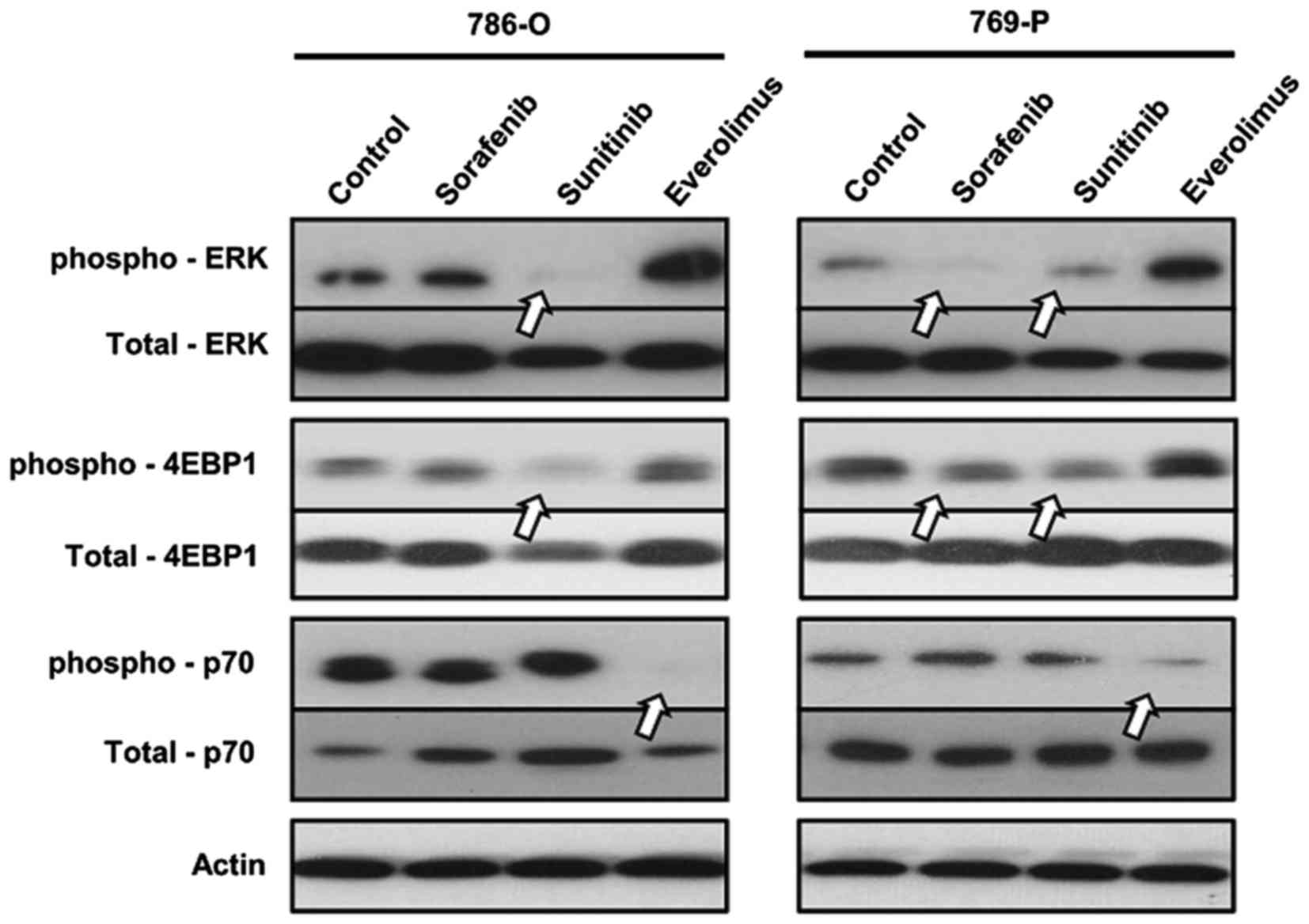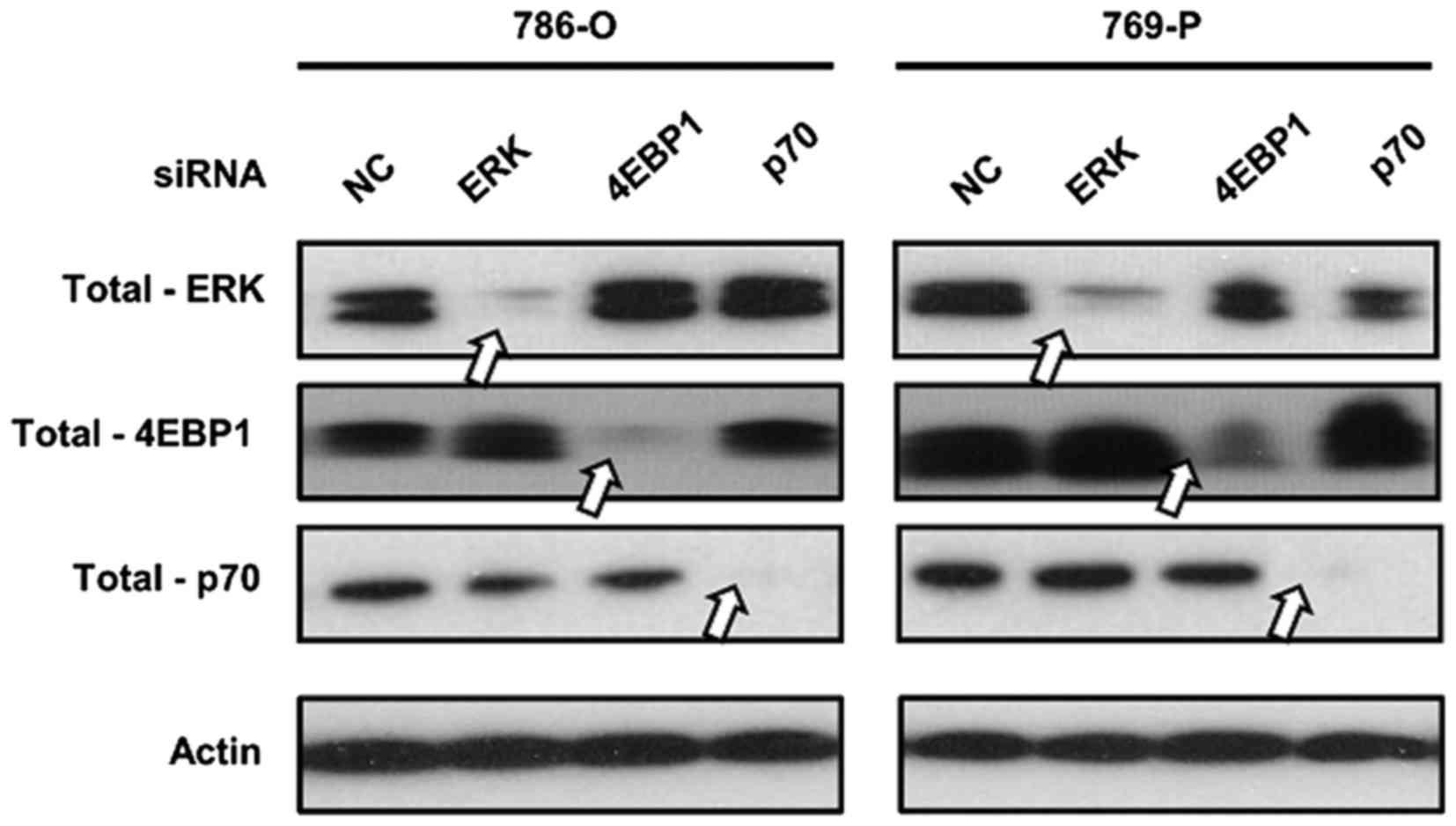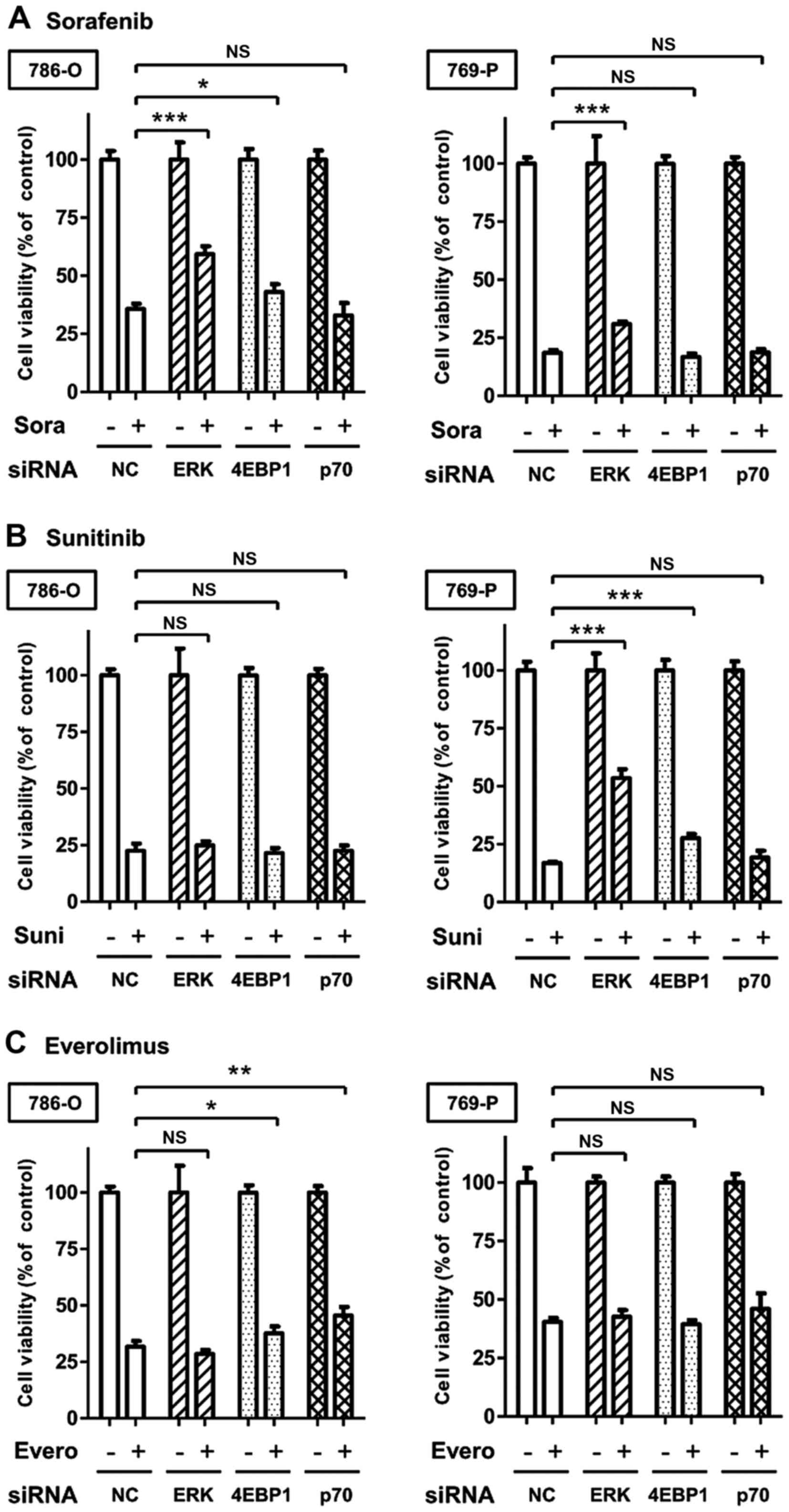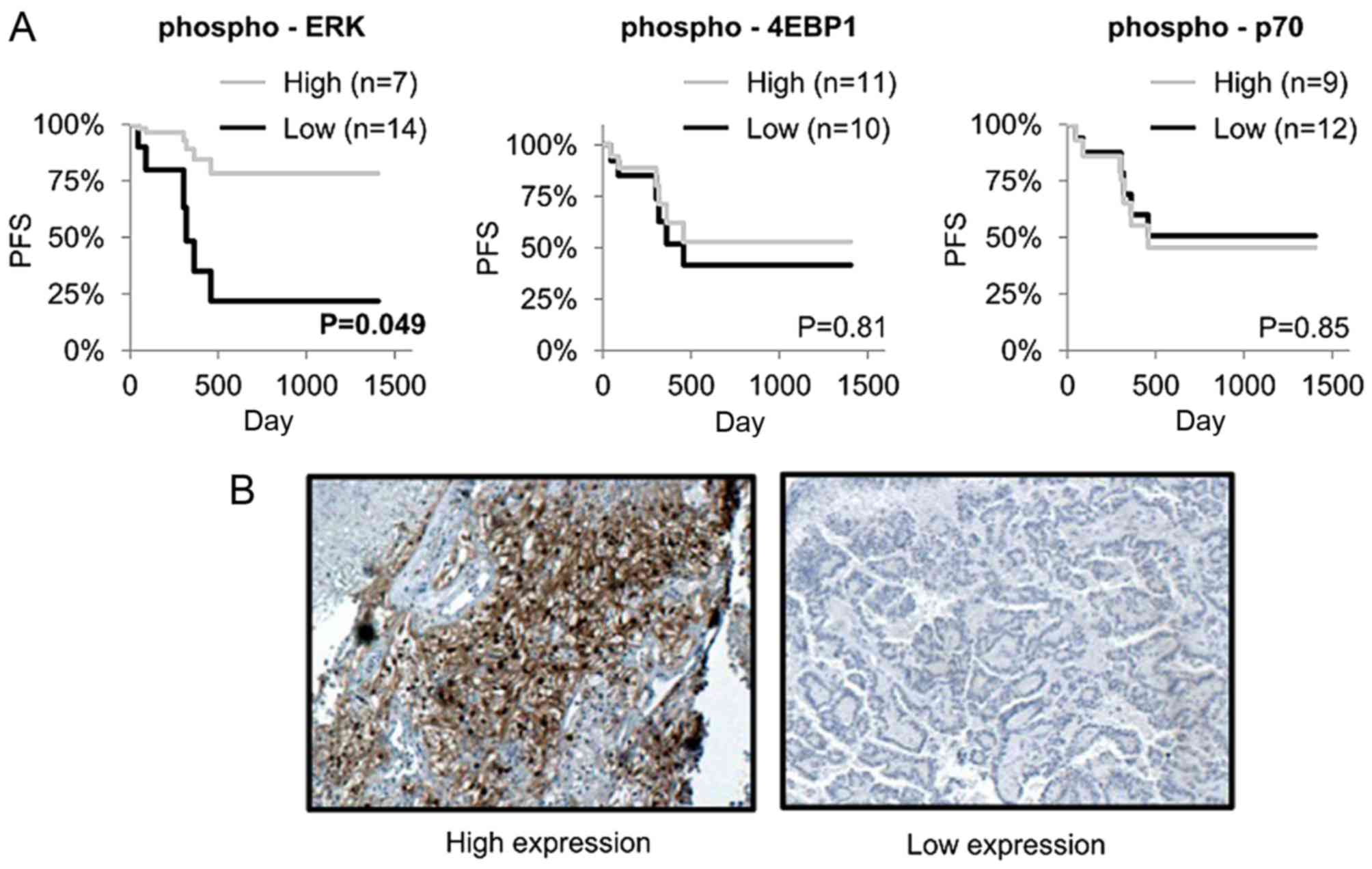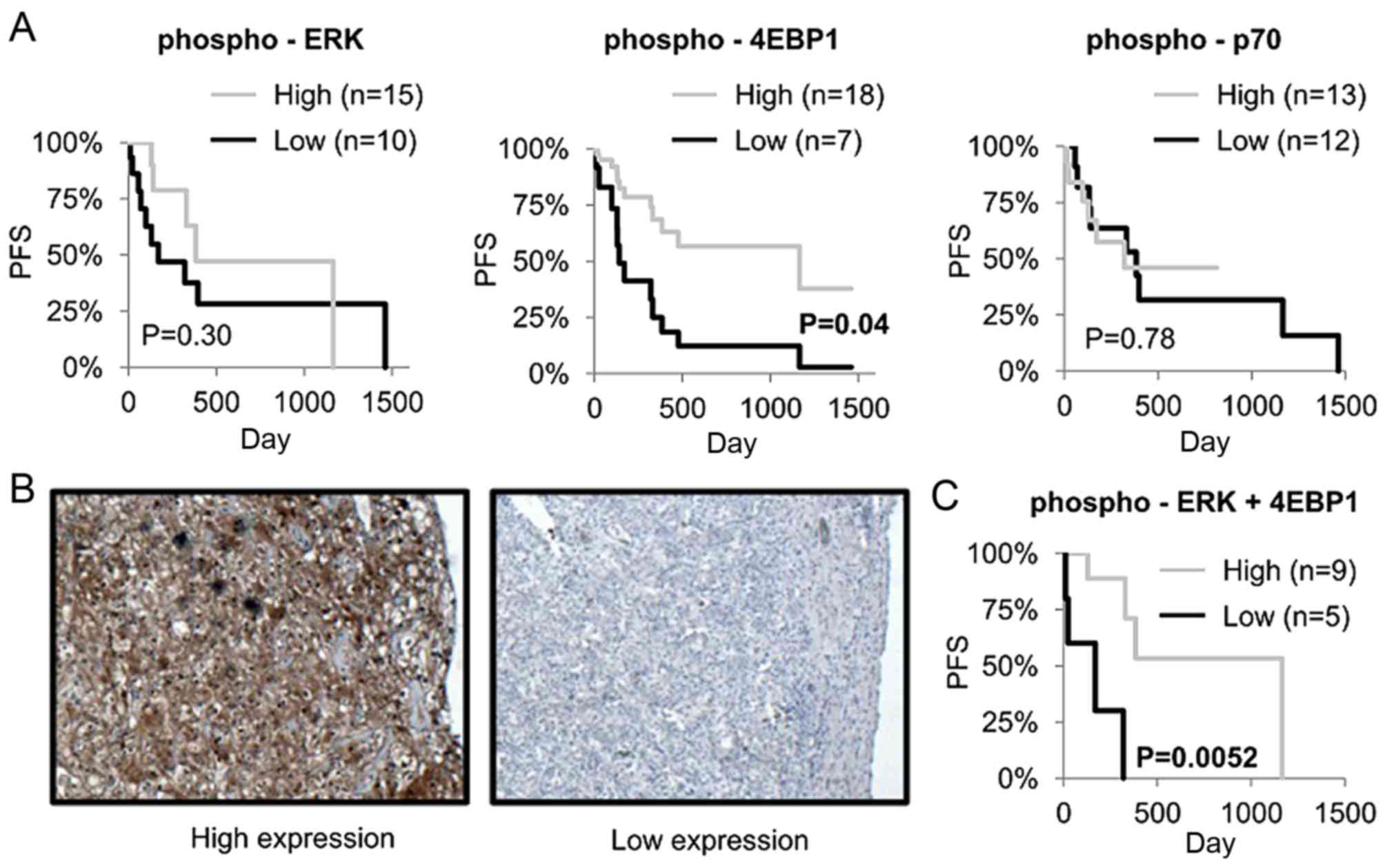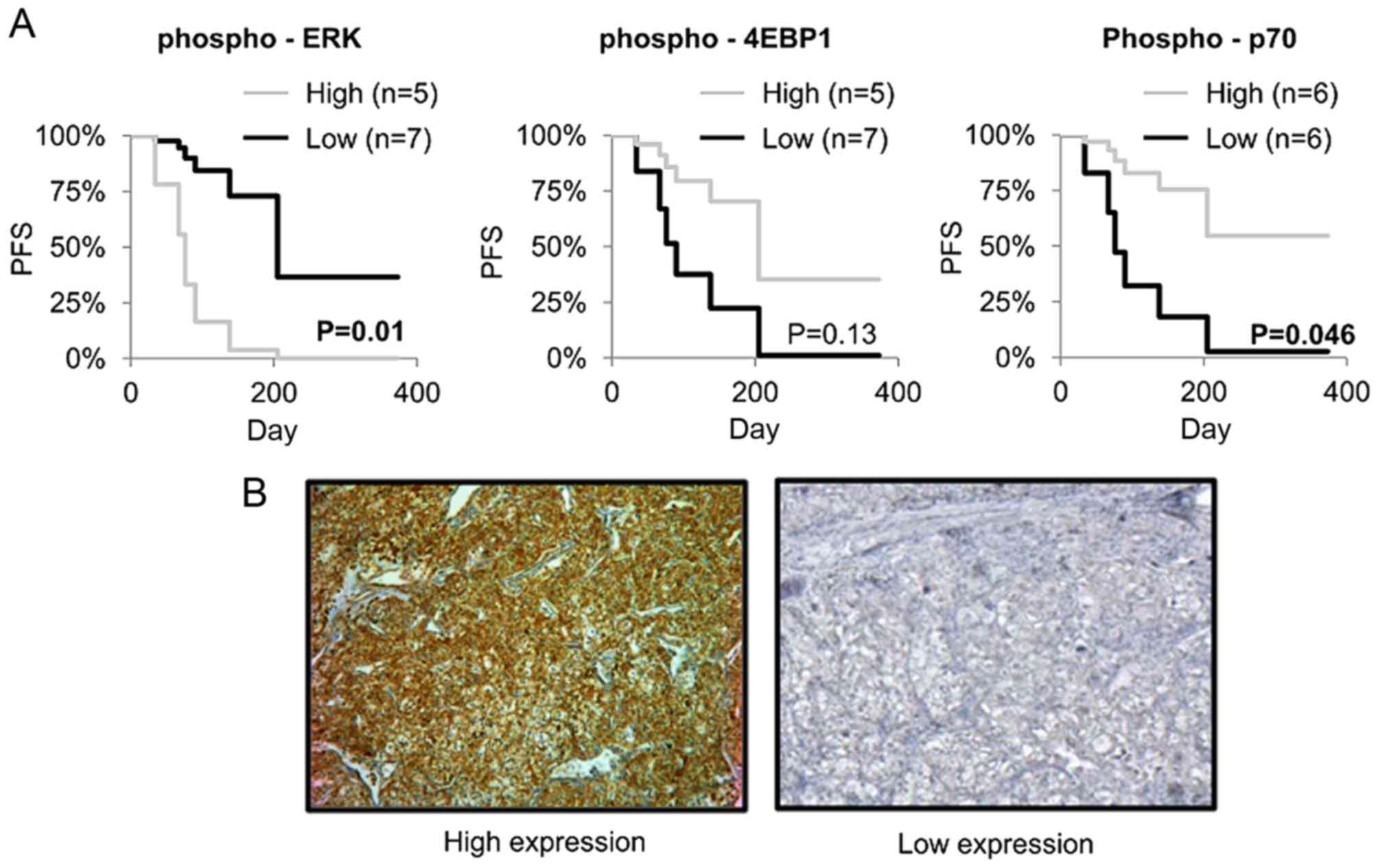|
1
|
Carlomagno F, Anaganti S, Guida T,
Salvatore G, Troncone G, Wilhelm SM and Santoro M: BAY 43–9006
inhibition of oncogenic RET mutants. J Natl Cancer Inst.
98:326–334. 2006. View Article : Google Scholar : PubMed/NCBI
|
|
2
|
Wilhelm SM, Carter C, Tang L, Wilkie D,
McNabola A, Rong H, Chen C, Zhang X, Vincent P, McHugh M, et al:
BAY 43–9006 exhibits broad spectrum oral antitumor activity and
targets the RAF/MEK/ERK pathway and receptor tyrosine kinases
involved in tumor progression and angiogenesis. Cancer Res.
64:7099–7109. 2004. View Article : Google Scholar : PubMed/NCBI
|
|
3
|
Escudier B, Eisen T, Stadler WM, Szczylik
C, Oudard S, Siebels M, Negrier S, Chevreau C, Solska E, Desai AA,
et al: TARGET Study Group: Sorafenib in advanced clear-cell
renal-cell carcinoma. N Engl J Med. 356:125–134. 2007. View Article : Google Scholar : PubMed/NCBI
|
|
4
|
Motzer RJ, Michaelson MD, Redman BG, Hudes
GR, Wilding G, Figlin RA, Ginsberg MS, Kim ST, Baum CM, DePrimo SE,
et al: Activity of SU11248, a multitargeted inhibitor of vascular
endothelial growth factor receptor and platelet-derived growth
factor receptor, in patients with metastatic renal cell carcinoma.
J Clin Oncol. 24:16–24. 2006. View Article : Google Scholar : PubMed/NCBI
|
|
5
|
Rini BI and Small EJ: Biology and clinical
development of vascular endothelial growth factor-targeted therapy
in renal cell carcinoma. J Clin Oncol. 23:1028–1043. 2005.
View Article : Google Scholar : PubMed/NCBI
|
|
6
|
Motzer RJ, Hutson TE, Tomczak P,
Michaelson MD, Bukowski RM, Rixe O, Oudard S, Negrier S, Szczylik
C, Kim ST, et al: Sunitinib versus interferon alfa in metastatic
renal-cell carcinoma. N Engl J Med. 356:115–124. 2007. View Article : Google Scholar : PubMed/NCBI
|
|
7
|
Motzer RJ, Escudier B, Oudard S, Hutson
TE, Porta C, Bracarda S, Grünwald V, Thompson JA, Figlin RA,
Hollaender N, et al: RECORD-1 Study Group: Efficacy of everolimus
in advanced renal cell carcinoma: A double-blind, randomised,
placebo-controlled phase III trial. Lancet. 372:449–456. 2008.
View Article : Google Scholar : PubMed/NCBI
|
|
8
|
Szmit S, Langiewicz P, Złnierek J,
Nurzyński P, Zaborowska M, Filipiak KJ, Opolski G and Szczylik C:
Hypertension as a predictive factor for survival outcomes in
patients with metastatic renal cell carcinoma treated with
sunitinib after progression on cytokines. Kidney Blood Press Res.
35:18–25. 2012. View Article : Google Scholar : PubMed/NCBI
|
|
9
|
Kust D, Prpić M, Murgić J, Jazvić M,
Jakšić B, Krilić D, Bolanča A and Kusić Z: Hypothyroidism as a
predictive clinical marker of better treatment response to
sunitinib therapy. Anticancer Res. 34:3177–3184. 2014.PubMed/NCBI
|
|
10
|
Di Fiore F, Rigal O, Ménager C, Michel P
and Pfister C: Severe clinical toxicities are correlated with
survival in patients with advanced renal cell carcinoma treated
with sunitinib and sorafenib. Br J Cancer. 105:1811–1813. 2011.
View Article : Google Scholar : PubMed/NCBI
|
|
11
|
Funakoshi T, Lee CH and Hsieh JJ: A
systematic review of predictive and prognostic biomarkers for
VEGF-targeted therapy in renal cell carcinoma. Cancer Treat Rev.
40:533–547. 2014. View Article : Google Scholar : PubMed/NCBI
|
|
12
|
Sheppard K, Kinross KM, Solomon B, Pearson
RB and Phillips WA: Targeting PI3 kinase/AKT/mTOR signaling in
cancer. Crit Rev Oncog. 17:69–95. 2012. View Article : Google Scholar : PubMed/NCBI
|
|
13
|
Miyake M, Ishii M, Kawashima K, Kodama T,
Sugano K, Fujimoto K and Hirao Y: siRNA-mediated knockdown of the
heme synthesis and degradation pathways: Modulation of treatment
effect of 5-aminolevulinic acid-based photodynamic therapy in
urothelial cancer cell lines. Photochem Photobiol. 85:1020–1027.
2009. View Article : Google Scholar : PubMed/NCBI
|
|
14
|
Miyake M, Fujimoto K, Anai S, Ohnishi S,
Kuwada M, Nakai Y, Inoue T, Matsumura Y, Tomioka A, Ikeda T, et al:
Heme oxygenase-1 promotes angiogenesis in urothelial carcinoma of
the urinary bladder. Oncol Rep. 25:653–660. 2011. View Article : Google Scholar : PubMed/NCBI
|
|
15
|
Zhou X, Tan M, Hawthorne V Stone, Klos KS,
Lan KH, Yang Y, Yang W, Smith TL, Shi D and Yu D: Activation of the
Akt/mammalian target of rapamycin/4E-BP1 pathway by ErbB2
overexpression predicts tumor progression in breast cancers. Clin
Cancer Res. 10:6779–6788. 2004. View Article : Google Scholar : PubMed/NCBI
|
|
16
|
Garcia-Roig M, Ortiz N and Lokeshwar V:
Molecular marker for predicting treatment response in advanced
renal cell carcinoma: Does the promise fulfill clinical need? Curr
Urol Rep. 15:3752014. View Article : Google Scholar : PubMed/NCBI
|
|
17
|
Zhang Z, Zhou X, Shen H, Wang D and Wang
Y: Phosphorylated ERK is a potential predictor of sensitivity to
sorafenib when treating hepatocellular carcinoma: Evidence from an
in vitro study. BMC Med. 7:412009. View Article : Google Scholar : PubMed/NCBI
|
|
18
|
Liu L, Cao Y, Chen C, Zhang X, McNabola A,
Wilkie D, Wilhelm S, Lynch M and Carter C: Sorafenib blocks the
RAF/MEK/ERK pathway, inhibits tumor angiogenesis, and induces tumor
cell apoptosis in hepatocellular carcinoma model PLC/PRF/5. Cancer
Res. 66:11851–11858. 2006. View Article : Google Scholar : PubMed/NCBI
|
|
19
|
Campbell L, Nuttall R, Griffiths D and
Gumbleton M: Activated extracellular signal-regulated kinase is an
independent prognostic factor in clinically confined renal cell
carcinoma. Cancer. 115:3457–3467. 2009. View Article : Google Scholar : PubMed/NCBI
|
|
20
|
Oka H, Chatani Y, Hoshino R, Ogawa O,
Kakehi Y, Terachi T, Okada Y, Kawaichi M, Kohno M and Yoshida O:
Constitutive activation of mitogen-activated protein (MAP) kinases
in human renal cell carcinoma. Cancer Res. 55:4182–4187.
1995.PubMed/NCBI
|
|
21
|
You D, Song SH, Cho YM, Lee JL, Jeong IG,
Song C, Hong JH, Kim CS and Ahn H: Predictive role of tissue-based
molecular markers in patients treated with sunitinib for metastatic
renal cell carcinoma. World J Urol. 33:111–118. 2015. View Article : Google Scholar : PubMed/NCBI
|
|
22
|
Terakawa T, Miyake H, Kusuda Y and
Fujisawa M: Expression level of vascular endothelial growth factor
receptor-2 in radical nephrectomy specimens as a prognostic
predictor in patients with metastatic renal cell carcinoma treated
with sunitinib. Urol Oncol. 31:493–498. 2013. View Article : Google Scholar : PubMed/NCBI
|
|
23
|
Trinh XB, Tjalma WAA, Vermeulen PB, Van
den Eynden G, Van der Auwera I, Van Laere SJ, Helleman J, Berns EM,
Dirix LY and van Dam PA: The VEGF pathway and the AKT/mTOR/p70S6K1
signalling pathway in human epithelial ovarian cancer. Br J Cancer.
100:971–978. 2009. View Article : Google Scholar : PubMed/NCBI
|
|
24
|
Takeuchi A, Eto M, Shiota M, Tatsugami K,
Yokomizo A, Kuroiwa K, Itsumi M and Naito S: Sunitinib enhances
antitumor effects against chemotherapy-resistant bladder cancer
through suppression of ERK1/2 phosphorylation. Int J Oncol.
40:1691–1696. 2012.PubMed/NCBI
|
|
25
|
Fenton MS, Marion KM, Salem AK, Hogen R,
Naeim F and Hershman JM: Sunitinib inhibits MEK/ERK and SAPK/JNK
pathways and increases sodium/iodide symporter expression in
papillary thyroid cancer. Thyroid. 20:965–974. 2010. View Article : Google Scholar : PubMed/NCBI
|
|
26
|
Robb VA, Karbowniczek M, Klein-Szanto AJ
and Henske EP: Activation of the mTOR signaling pathway in renal
clear cell carcinoma. J Urol. 177:346–352. 2007. View Article : Google Scholar : PubMed/NCBI
|
|
27
|
Nishikawa M, Miyake H, Harada K and
Fujisawa M: Expression level of phosphorylated-4E-binding protein 1
in radical nephrectomy specimens as a prognostic predictor in
patients with metastatic renal cell carcinoma treated with
mammalian target of rapamycin inhibitors. Med Oncol. 31:7922014.
View Article : Google Scholar : PubMed/NCBI
|
|
28
|
Gerlinger M, Horswell S, Larkin J, Rowan
AJ, Salm MP, Varela I, Fisher R, McGranahan N, Matthews N, Santos
CR, et al: Genomic architecture and evolution of clear cell renal
cell carcinomas defined by multiregion sequencing. Nat Genet.
46:225–233. 2014. View
Article : Google Scholar : PubMed/NCBI
|
|
29
|
Cho D, Signoretti S, Dabora S, Regan M,
Seeley A, Mariotti M, Youmans A, Polivy A, Mandato L, McDermott D,
et al: Potential histologic and molecular predictors of response to
temsirolimus in patients with advanced renal cell carcinoma. Clin
Genitourin Cancer. 5:379–385. 2007. View Article : Google Scholar : PubMed/NCBI
|















